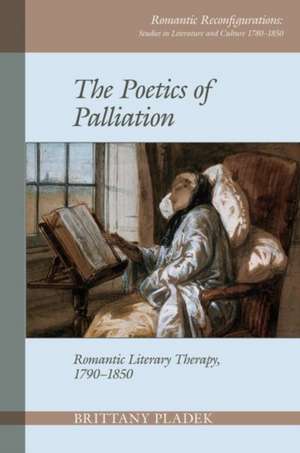The Poetics of Palliation – Romantic Literary Therapy, 1790–1850
Autor Brittany Pladeken Limba Engleză Paperback – 31 ian 2022
again. But this model oversimplifies how Romantic writers thought literature addressed suffering. Poetics documents how writers like William Wordsworth and Mary Shelley explored palliative forms of literary medicine: therapies that stressed literature's manifold relationship to pain and its power to
sustain, comfort, and challenge even when cure was not possible. The book charts how Romantic writers developed these palliative poetics in conversation with their medical milieu. British medical ethics was first codified during the Romantic period. Its major writers, John Gregory and Thomas
Percival, endorsed a palliative mandate to compensate for doctors' limited curative powers. Similarly, Romantic writers sought palliative approaches when their work failed to achieve starker curative goals. The startling diversity of their results illustrates how palliation offers a more
comprehensive metric for literary therapy than the curative traditions we have inherited from Romanticism.
Preț: 412.47 lei
Nou
Puncte Express: 619
Preț estimativ în valută:
78.94€ • 82.31$ • 65.60£
78.94€ • 82.31$ • 65.60£
Carte tipărită la comandă
Livrare economică 21 martie-04 aprilie
Preluare comenzi: 021 569.72.76
Specificații
ISBN-13: 9781800854789
ISBN-10: 1800854781
Pagini: 296
Dimensiuni: 157 x 234 x 18 mm
Greutate: 0.42 kg
Editura: Liverpool University Press
ISBN-10: 1800854781
Pagini: 296
Dimensiuni: 157 x 234 x 18 mm
Greutate: 0.42 kg
Editura: Liverpool University Press
Descriere
The Poetics of Palliation argues that Romanticism developed richer literary therapies than its contemporary reception remembers. By reading Romantic writers against Georgian medical ethics, Poetics recovers their models of literature as comfort and sustenance, challenging a health humanities tradition that sees literary therapy primarily as cure.
